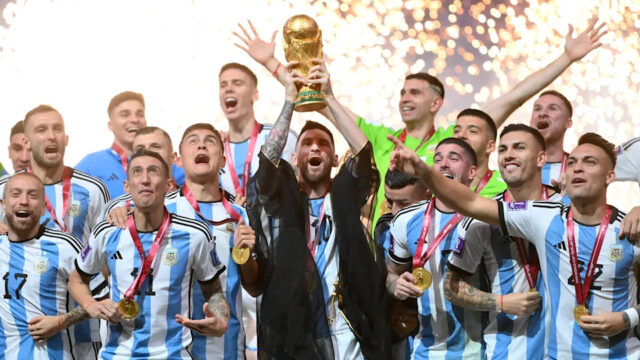The biggest sporting extravaganza, the FIFA World Cup Qatar 2022, drew its concluding breath on December 18, 2022, in what was possibly the most entertaining final that the tournament has seen in recent years. Argentina scored two goals to register a lead in the first half. The French side picked up some momentum in the second, and by the 85th minute, they had equalized the score at 2-2. Both the teams played some of their most inspired football, but in the end, France No. 10 Kylian Mbappe’s hat trick fell short of winning glory and it was the men in blue and white who lifted the trophy.
This win marks Argentina‘s third World Cup; the last time was when legend Diego Maradona led the country to victory in 1986. With this win, Lionel Messi also becomes one of the most decorated football players in the history of the sport. The seven-time Ballon d’Or winner can now finally claim to be the world champion, thus completing his already glorious resume.
The final was witnessed in person by several world leaders, like the French president, Emmanuel Macron, who was an invitee of the Emir of Qatar, Sheikh Tamim ibn Hamid Al Thani. Macron was also seen consoling his players in the locker room after awarding some of the medals to the winners and runners-up at the prize distribution ceremony.
Even though the world is talking about these two teams, the real winner in terms of diplomacy is Qatar. As the first Middle Eastern country to host the event, Qatar, despite concerns from other nations has managed to pull off the World Cup, without major glitches. This marks a feat that none of its other neighbours in the Arab Peninsula have managed so far.
The various ways in which Qatar has benefitted from the World cup are as follows:
Qatar’s Equity Market
In the first ten months of 2022, Qatar registered USD 4 billion of foreign inflows. While markets in previous World Cup host countries have experienced similar growth, Qatar has outperformed its recent peers. The Qatar Stock Exchange (QSE) reported an appreciation of as much as 24.7 percent from the beginning of 2022 until April 2022. In comparison to the last five years, Qatar’s stock market was reportedly up by more than 50 percent. Thus, Qatar can use this opportunity and the international visibility offered by the event as a springboard to not only increase international tourism but also boost foreign investments.
Infrastructural Development
Qatar won the rights to host the 2022 World Cup in 2010. The next 12 years saw Qatar spend more than USD 300 billion to upgrade its infrastructure, including nine new state-of-the-art stadiums, the Doha Metro, thousands of kilometres of local roads and highways, a new port, a new airport, and a new city to accommodate the event. Among the stadiums, Qatar’s Stadium 974 is a milestone in sustainability as it is built mainly from recycled or recyclable materials and is also disassembled. Furthermore, to allay concerns about the high temperatures that the Gulf country experiences, the eight stadiums used for matches were equipped with air conditioning.
Cultural Progress and Promotion of Diversity
Sporting events with a scale like that of the FIFA World Cup have historically seen foot traffic from football fans across the world. 2022 was not any different. However, the fact that Qatar hosted the event demonstrated to the rest of the world the region’s culture and heritage are significant. Moreover, the opening and closing ceremonies and the official songs for the event consisted of a myriad of performers from various ethnicities and nationalities, ranging from Trinidad and Tobago to India to South Korea. Furthermore, former Spanish captain Iker Casillas and Indian actress Deepika Padukone unveiled the trophy, which also promoted diversity.
—









